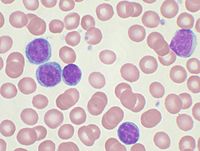
Photo from wikipedia
Background In some patients with metastatic differentiated thyroid cancer, even if they had substantial of radioactive iodine (RAI) uptake, the RAI therapy response was poor. We investigated the usefulness of… Click to show full abstract
Background In some patients with metastatic differentiated thyroid cancer, even if they had substantial of radioactive iodine (RAI) uptake, the RAI therapy response was poor. We investigated the usefulness of FDG PET/CT for the early prediction of RAI therapy response in the patients with metastatic differentiated thyroid cancer (DTC). Methods The 54 metastatic DTC patients who underwent both RAI therapy scan and FDG PET/CT at the same period were enrolled in the study. Clinical information and several parameters from RAI therapy scan and FDG PET/CT were investigated. Therapeutic response of RAI was assessed as two categories: response rate (RR) and disease control rate (DCR). Results Twenty-two patients (41%) had therapeutic response to RAI therapy, whereas 32 (59%) patients did not. There were no significant differences in age, sex, stage, histology, metastasis site, stimulated Tg or Tg-Ab, therapeutic doses, and even RAI uptake pattern among two groups. However, there was a significant negative correlation between FDG avidity of metastatic lesions and RR (OR = 0.233; p = 0.016). Although the patient group with only RAI uptake showed a significant correlation with RR (OR = 5.833; p = 0.01), the patient group with both RAI and FDG uptake did not show any significant correlation with RR. In the subgroup analysis, uptake grades of RAI or FDG was well correlated with DCR. Conclusions The patient group with FDG uptake in metastatic DTC showed poor response to RAI therapy regardless of the degree of RAI uptake. Therefore, FDG PET/CT may help us identify the patients with radioiodine refractory DTC and establish an appropriate treatment strategy in the early period.
Journal Title: PLoS ONE
Year Published: 2019
Link to full text (if available)
Share on Social Media: Sign Up to like & get
recommendations!